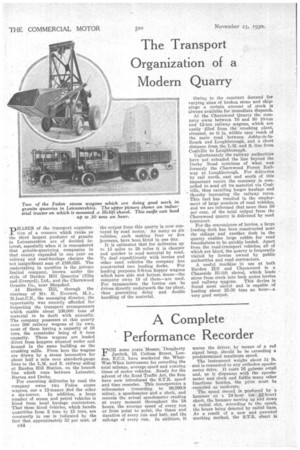The Transport Organization of a Modern Quarry
Page 66

If you've noticed an error in this article please click here to report it so we can fix it.
pHASDS of the transport organization of a concern which ranks as the third largest producer of granite in Leicestershire are of decided interest, especially when it is remembered that granite-quarrying companies in that county expended in one year on railway and road-haulage charges the not insignificant sum of £168,626. The undertaking in question is the private limited • company, known under the style of Barden Hill Quarries (Ellis and Everard), Ltd., and the Charnwood Granite Co., near Shepshed.
At Barden Hill, through the courtesy of Mr. R Everard, M.A., M.Inst.C.E., the managing director, the opportunity was recently afforded for inspecting the transport arrangements which enable about 100,000 tons of material to be dealt with annually. The company possesses at this quarry over 300 railway wagons of its own, most of them having a capacity of 10 tons, the remainder being of 8 tons capacity. These wagons are loaded direct from hoppers situated under and housed in the same building as the crushing mills. From here the wagons are drawn by a steam locomotive for about half a mile over standard-gauge lines to the L.M. and S. railway siding at Pardon Hill Station, on the branch line which runs between Leicester, Burton and Derby.
For executing deliveries by road the company owns two Poden steam wagons, one a 12-touner alrid the other a six-tonner. In addition, a large number of steam and petrol vehicles is hired from local haulage contractors. That these hired vehicles, which handle quantities from 5 tons to 15 tons, are constantly in use is indicated by the fact that approximately 33 per cent, of c44 the output from this quarry is now conveyed by road motor. As many as six vehicles, each making four or five journeys, have been hired in one day.
It is estimated that for deliveries up to 15 miles to 20 miles it is cheaper and quicker to send material by road. To deal expeditiously with lorries and other road vehicles the company has constructed two loading docks. For loading purposes 5-6-ton hopper wagons which have side and bottom doors—the company owns 19 of them—are used. For tarmacadam the lorries can be driven directly underneath the tar plant, thus preventing delay and double handling of the material. Owing to the constant demand for varying sizes of broken stone and chippings a certain amount of stock is always available for immediate dispatch.
At the Charnwood Quarry the company owns between 70 and 80 10-ton and 12-ton railway wagons, which are easily filled from the crushing plant, situated, as it is, within easy reach of the main road between Ashby-de-laZouch and Loughborough, and a short distance from the L.M. and S. line from Coalville to Loughborough.
Unfortunately the railway authorities have not extended the line beyond the Derby Road terminus of what was formerly the Charnwood Forest Railway at Loughborough. For deliveries by rail north, east and south of this important centre the company is compelled to send all its material via Coalvine, thus entailing longer haulage and thereby increasing the railway rates. This fact has resulted in the employment of large numbers of road vehicles, and we are informed that more than 50 per cent, of the total output from the Charnwood quarry is delivered by road transport.
For the convenience of lorries, a large loading dock has been constructed near the sidings and another dock in the quarry, enables large rubble for road foundations to be quickly loaded. Apart from the road-transport vehicles, all of which are hired, the quarry is frequently visited by lorries owned by public authorities and road contractors.
A useful machine in use at both Pardon Hill and Charnwood is a Chaseside Hi-lift shovel, which loads stone from stock into both motor lorries and railway wagons. This device is found most useful and is capable of loading about 25-30 tons an hour—a very good output.












































































































